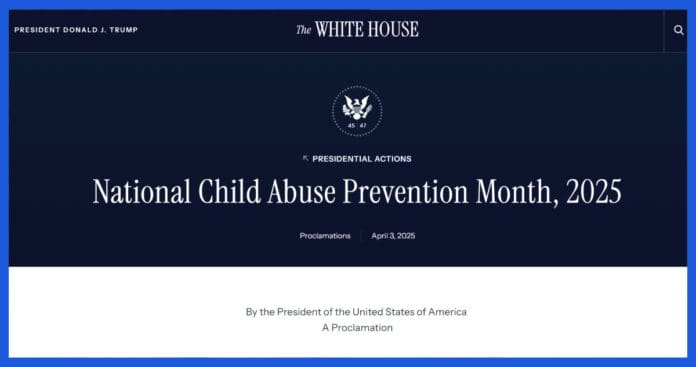In a recent proclamation marking National Child Abuse Prevention Month, President Donald Trump has explicitly labeled “gender ideology” as a significant form of child abuse, signaling a direct challenge to the transgender community and its allies. This stance is consistent with the administration’s ongoing efforts to curtail transgender rights, raising profound concerns about the well-being and recognition of transgender individuals across the United States.
Proclamation Overview
On April 3, 2025, President Trump issued a proclamation for National Child Abuse Prevention Month, emphasizing the administration’s commitment to safeguarding children from various forms of harm. While the proclamation underscores the importance of preventing child abuse and neglect, it controversially identifies “gender ideology” as a prevalent threat. The President asserts that proponents of this ideology are misleading children into believing they are trapped in the wrong body, advocating for medical interventions such as hormone therapy and surgeries. He describes these actions as “evil and backwards lies” that deprive children of their happiness, health, and freedom.
Implications for the Transgender Community
This proclamation aligns with previous actions taken by the administration to restrict transgender rights. Notably, Executive Order 14187, signed earlier this year, prohibits public schools from teaching transgender topics and withdraws federal funding from institutions providing gender-affirming care to minors.
The administration’s framing of gender-affirming care as a form of child abuse has significant implications:
- Healthcare Access: By categorizing gender-affirming treatments as abusive, there is a heightened risk of reduced access to essential medical care for transgender youth. Healthcare providers may face legal and financial repercussions, leading to the discontinuation of services critical for the mental and physical health of transgender minors.
- Educational Environment: Schools may feel pressured to eliminate supportive resources for transgender students, fearing loss of federal funding or legal action. This could result in the removal of inclusive curricula, support groups, and policies that respect students’ gender identities, fostering an environment of exclusion and discrimination.
- Legal Precedents: Labeling gender-affirming care as child abuse sets a concerning precedent that could influence state and local policies. It may embolden efforts to criminalize supportive actions by parents, educators, and healthcare professionals, further marginalizing transgender individuals.
Community Response and Advocacy
In response to these developments, advocacy groups and legal organizations are mobilizing to challenge the administration’s policies:
- Lambda Legal has condemned the executive orders, stating that compelling schools to disregard the identities of LGBTQ+ youth not only exposes them to harm but actively encourages it.
- Legal Challenges: Multiple lawsuits have been filed contesting the legality of the executive orders and proclamations. Federal judges have issued injunctions blocking certain provisions, such as withholding federal funds from hospitals providing gender-affirming care to minors.
- State Resistance: Several states, including California, have reaffirmed their commitment to protecting transgender rights. California’s robust legal protections for transgender individuals may serve as a countermeasure against federal directives, though the conflict between state and federal policies remains a contentious legal battleground.
The Bottom Line
The current administration’s stance represents a significant shift in federal policy regarding transgender rights, contrasting sharply with previous protections and recognition. The transgender community, along with its allies, faces an increasingly challenging environment that necessitates vigilant advocacy and support.
It is imperative for individuals and organizations to stay informed about these policy changes, engage in supportive networks, and participate in advocacy efforts aimed at safeguarding the rights and well-being of transgender individuals. Legal avenues remain a critical front in contesting policies perceived as discriminatory, and public awareness can play a pivotal role in shaping a more inclusive and accepting society.
As the nation observes National Child Abuse Prevention Month, it is crucial to recognize and challenge narratives that conflate supportive care for transgender youth with abuse. Affirming the identities of transgender individuals and ensuring access to appropriate medical and psychological care are essential components of fostering a society that values diversity, inclusion, and human rights.


